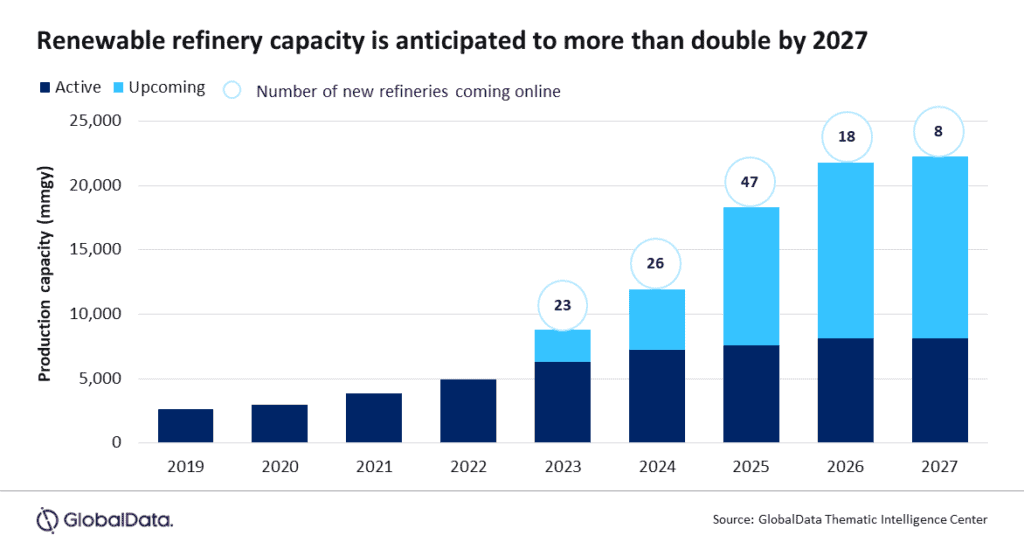
With electrification the core driver of decarbonisation, it is easy to overlook the dynamic market growth happening in renewable biofuel production, where capacity is set to more than double in under four years.
Renewable fuels are biofuels that are produced using advanced biomass such as wastes from agriculture, forestry, food processing, and non-edible crops. These are rapidly gaining popularity among refiners globally due to their potential role in the energy transition, when compared with petroleum fuels.
As a result, biofuels such as renewable diesel and sustainable aviation fuel (SAF) are attracting investments from downstream companies worldwide, according to leading data and analytics company GlobalData.
Diversifying production to ease food security
Out this month, a new thematic report on Biofuels published by GlobalData provides an overview of the global biofuels industry and its potential role in the energy transition.
It benchmarks leading companies, such as Neste, Marathon Petroleum, Valero, and Phillips 66, based on their active and upcoming capacity in renewable fuels.
It also evaluates the industry, technology, and regulatory trends within the biofuels industry.
Whilst biofuels can be produced from a diverse set of renewable biomasses, via combustion or processing, food security issues will be key, explains, Ravindra Puranik, Oil and Gas Analyst at GlobalData:
“Conventional biofuels, such as ethanol or biodiesel, which use edible biomass as feedstock, have been in commercial use for a long time now. However, the use of advanced feedstock for fuel production is the need of the hour as it would ease food security concerns that have aggravated globally in recent years.”
Wide range of applications as ‘drop-in’ fuel
Biofuels are intended to blend with conventional fuels, plus even potentially be used as transportation fuels in the long-term to reduce the dependency on fossil fuels.
Not surprisingly, therefore, the biofuel production process is largely similar to that of crude-oil refining.
Renewable fuels themselves are regarded as ‘drop-in’ fuels as they can be blended with petroleum fuels in varying concentrations, or even used directly in vehicles without any major engine modifications.
Their application set is relatively wide-ranging, including use cases in automobiles, aviation, shipping, domestic and industrial heating, as well as petrochemical feedstocks.
Therefore, as demand grows and policy shifts, the industry is responding with investment, adds Puranik:
“Several countries have introduced mandates for blending biofuels with gasoline, diesel, and jet fuel to help reduce emissions from the transportation sector. Neste, Valero, Marathon Petroleum and many others are setting up renewable diesel and SAF plants to reap from the regulatory push.”
Looking ahead, technological development could push global production up even higher, concludes Puranik:
“The biofuel industry could benefit from feedstock diversification to prevent the scarcity of any one source. Advanced biofuels address these concerns, besides tackling challenges over land availability, biodiversity loss, and price volatility due to crop failure. The scaling up of renewable refinery capacities is also essential to lower the production costs in the long-term, making these fuels competitive enough to replace petroleum fuels.”
Further Reading:
- More about a new thematic report on Biofuels published by GlobalData;
- More on companies benchmarked, such as Neste, Marathon Petroleum, Valero, and Phillips 66;
- Also on SustMeme, Call to invest $35 trillion in transition tech by 2030;
- Also on SustMeme, Jet fuel from waste plastic brings clean air travel step closer;
- Also on SustMeme, World’s most sustainable glass bottle created in biofuel trial;
- Also on SustMeme, Why there is more to anaerobic digestion than just food;
- Also on SustMeme, 5 principles for a post-COVID bioeconomy.
Check out the full archive of stories on the SustMeme Climate & Energy Channel, now available to Sponsor.





